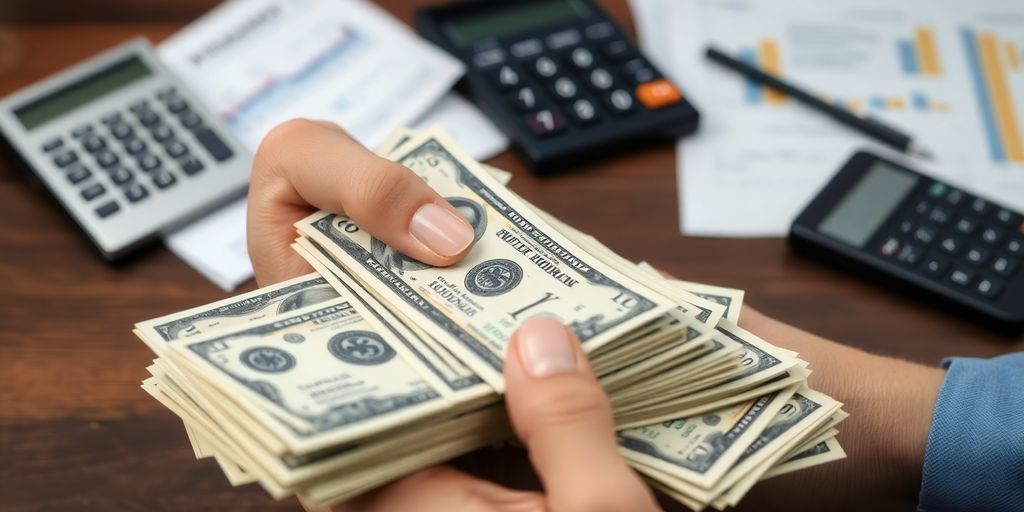
Paying off debt can feel like a huge mountain to climb, but with the right strategies, it's totally doable. Whether you're dealing with student loans, credit cards, or any other type of debt, the key is to have a plan and stick to it. This article will walk you through some proven ways to get rid of debt faster, so you can breathe a little easier and maybe even save some money along the way. Let's dive into these strategies and see how you can tackle your debt head-on.
Key Takeaways
- Understanding your debt is the first step to paying it off. List all your debts and know what you owe.
- Budgeting is crucial. Create a realistic budget and cut out unnecessary expenses to allocate more money to debt repayment.
- Choosing the right debt repayment strategy, like the Avalanche or Snowball method, can make a big difference in how fast you pay off debt.
- Increasing your income through side jobs to pay off debt or negotiating a raise can speed up debt repayment.
- Avoid common mistakes like ignoring interest rates and failing to adjust your budget as needed.
Understanding Your Debt Situation
Assess Your Total Debt
First things first, it's time to face the music and evaluate your debt head-on. Start by listing every single debt you owe. This includes credit cards, student loans, car loans, personal loans, medical bills, and even that $50 you owe your cousin. For each of these debts, jot down the current balance, the interest rate, the minimum monthly payment, and the due date. This will give you a comprehensive view of what you're up against.
Here's a simple table to help organize your information:
| Debt Type | Balance | Interest Rate | Minimum Payment | Due Date |
|---|---|---|---|---|
| Credit Card | $3,000 | 18% | $90 | 15th |
| Student Loan | $10,000 | 5% | $150 | 1st |
| Car Loan | $7,000 | 6% | $200 | 20th |
Identify High-Interest Debts
Now that you have your list, you can pinpoint which debts are costing you the most in interest. High-interest debts, like certain credit cards, can quickly spiral out of control if not addressed promptly. Prioritizing these debts can save you a lot of money in the long run. Consider focusing your repayment efforts on these first.
Track Your Spending Habits
Understanding where your money goes each month is crucial to managing your debt. Start by tracking every expense for a month. Use an app, a spreadsheet, or even a notebook. You'll likely be surprised by how much you spend on things like dining out or subscriptions.
Here's a simple way to start:
- Record every purchase, no matter how small.
- Categorize your spending (e.g., groceries, entertainment, utilities).
- Review your spending at the end of the month to identify areas where you can cut back.
"Taking control of your spending is the first step towards financial freedom. It's not just about cutting costs, but about understanding your financial habits and making informed decisions."
By thoroughly assessing your debt and spending habits, you're setting a solid foundation for tackling your debt head-on. Remember, the goal is to minimize stress and work towards financial freedom in 2025.
Effective Budgeting Techniques
Creating a budget is like setting a roadmap for your financial journey. It helps you know where your money is going and ensures you have enough to cover your needs and pay down debt. Here are some effective techniques to get you started:
Create a Realistic Budget
First, assess your income and expenses. Know exactly how much money is coming in and going out each month. Break down your expenses into budget categories like housing, food, and entertainment. This will help you see where you might be overspending. Use a simple spreadsheet or a budgeting app to track everything.
Cut Unnecessary Expenses
Once you know where your money is going, look for areas to cut back. Do you really need that streaming subscription you rarely use? Can you dine out less? Here's a quick list to consider:
- Cancel unused subscriptions.
- Cook at home instead of ordering takeout.
- Shop for deals and use coupons.
These small changes can free up cash to put toward your debt.
Allocate Savings to Debt Repayment
Any money you save from cutting expenses should go directly to paying off debt. This might mean making extra payments on your loans or credit cards. Every little bit helps, and over time, these extra payments can significantly reduce your debt load.
"Budgeting isn't about restricting yourself; it's about making room for the things that matter most."
Remember, sticking to a budget can be tough, but it's a powerful tool to help you manage your debt effectively. Stay disciplined, and you'll see progress.
Choosing the Right Debt Repayment Strategy
When it comes to tackling debt, picking the right repayment strategy can make a huge difference. Let's dive into some of the most effective methods you can choose from.
Debt Avalanche Method
The Debt Avalanche Method is all about prioritizing your debts based on interest rates. You start by paying off the debt with the highest interest rate first while making minimum payments on the rest. This approach saves you the most money in the long run because you're eliminating the most expensive debt first.
- Identify your highest-interest debt.
- Allocate any extra funds to this debt after covering minimum payments on others.
- Once it's paid off, move to the next highest-interest debt and repeat.
This method might take a bit longer to see results, but the financial benefits are worth it.
Debt Snowball Method
If you need a quick win to keep your motivation up, the Debt Snowball Method might be for you. Here, you focus on paying off your smallest debts first, regardless of interest rates. It's like picking the low-hanging fruit.
- List your debts from smallest to largest balance.
- Pay minimums on all debts except the smallest.
- Throw any extra cash at the smallest debt until it's gone.
- Move to the next smallest debt and repeat.
This method is great for building momentum and keeping you motivated as you see debts disappear one by one.
Debt Consolidation Options
Debt consolidation could be a lifesaver if you're juggling multiple debts. By combining them into a single loan, ideally with a lower interest rate, you simplify your payments and potentially save money.
- Consider a debt consolidation loan to lower your interest rates.
- Use a balance transfer credit card to take advantage of 0% interest offers.
- Ensure the new monthly payment fits your budget.
Choosing a stress-free debt repayment plan involves assessing your financial situation, understanding different types of repayment plans, and prioritizing your goals. This structured approach helps individuals manage their debts effectively and reduce financial stress.
Remember, the best strategy is the one that aligns with your financial goals and keeps you motivated to stay on track. Whether you opt for the Avalanche, Snowball, or Consolidation, the key is to start and stick with it.
Maximizing Income to Pay Off Debt

Explore Side Gigs
Looking for ways to ramp up your income? Consider diving into side gigs that match your skills. Whether it's freelance writing, graphic design, or tutoring, there's a gig out there for everyone. The best part? You get to choose projects that interest you, making it more enjoyable. Plus, the extra cash can be a game-changer for your debt repayment plan.
Negotiate a Raise
Feeling like you're worth more at your current job? It's time to ask for a raise. Do your homework—check out what others in your role are earning, and prepare to show your boss the value you've been adding to the team. Getting a bump in your salary can significantly boost your debt repayment efforts.
Sell Unused Items
Got stuff lying around that you don't use anymore? Turn it into cash! Platforms like eBay, Facebook Marketplace, or Craigslist are perfect for selling those items collecting dust. Not only will you declutter your space, but you'll also earn some extra bucks to put towards your debt.
Increasing your income isn't just about making more money—it's about using that money wisely. By channeling extra earnings towards your debt, you can accelerate your journey to financial freedom. Remember, every little bit counts when you're working towards becoming debt-free.
For more strategies on eliminating debt and maximizing savings, consider approaches like debt consolidation, the debt snowball method, and the debt avalanche approach.
Avoiding Common Debt Repayment Mistakes
Maintaining Old Spending Habits
When you're working to pay off debt, sticking to old spending habits can sabotage your progress. It's easy to fall back into the routine of swiping that credit card for non-essentials or indulging in unnecessary expenses. Take a moment to assess where your money is going. Are you still spending a lot on dining out or subscriptions you rarely use? Cutting back can free up funds to tackle your debt more aggressively. Breaking free from these habits is crucial for making meaningful progress.
Ignoring Interest Rates
Interest rates might seem like just a number, but they can significantly impact how long you'll be in debt. If you're only making minimum payments, you're mostly covering interest, not the principal. This can stretch your repayment period by years. Consider contacting your lenders to negotiate lower rates or explore refinancing options. Prioritizing debts with higher interest rates can save you a lot in the long run.
Failing to Adjust Your Budget
A budget isn't a one-time setup; it needs regular updates to reflect your current financial situation. As you pay off debt, your expenses and income might change. Make sure to adjust your budget accordingly. Switching to a cash-only system can help, as it forces you to spend only what you have. Keep a close eye on your spending and look for areas to cut back. Remember, every dollar saved is a dollar closer to being debt-free.
Staying disciplined with your budget and spending habits is key to freeing yourself from debt. It requires ongoing effort and a willingness to make tough choices, but the peace of mind that comes with financial freedom is worth it.
Leveraging Financial Tools and Resources
Use Debt Repayment Calculators
Debt repayment calculators are a great way to get a handle on what you owe and how long it’ll take to pay it off. These tools let you plug in your debts, interest rates, and monthly payment amounts to see the big picture. Knowing exactly how much you need to pay each month to meet your goals can be a game-changer. They can show you how making extra payments can speed up your journey to becoming debt-free. Plus, seeing those numbers drop can be super motivating.
Consult Credit Counselors
Sometimes, a little guidance can go a long way. Credit counselors can help you sort through your financial mess and figure out a solid plan to tackle your debt. They’re like personal trainers but for your money. They can help you create a budget, negotiate with creditors, and even set up a debt management plan if needed. Look for a nonprofit counselor who won’t charge you an arm and a leg.
Utilize Balance Transfer Offers
Balance transfers can be a smart move if you’re dealing with high-interest credit card debt. By moving your balance to a card with a lower interest rate, you can save on interest and pay off your debt faster. But watch out for transfer fees and make sure you pay off the balance before any introductory rates expire. It’s all about timing and making sure you’re not just shifting debt around without a plan.
Taking advantage of financial tools and resources can make the daunting task of debt repayment more manageable. From calculators that break down your payments to counselors providing personalized advice, these resources are there to help you succeed. Use them wisely, and you’ll be on your way to financial freedom in no time.
Staying Motivated on Your Debt-Free Journey

Celebrate Small Wins
Paying off debt can feel like a marathon, but celebrating small victories along the way can keep you energized. Did you pay off a credit card this month? Awesome! Treat yourself to something small, like a movie night at home. These little celebrations remind you that you're making progress.
Set Achievable Milestones
Breaking down your debt repayment into smaller, achievable milestones can make the whole process less overwhelming. Instead of focusing on the total amount, aim to clear a specific debt or reduce a chunk by a certain date. This way, you can track your progress and stay motivated.
Visualize Your Debt-Free Future
Imagine what your life will look like without debt. What will you do with the extra money? Travel, save for a house, or invest in hobbies? Visualizing your debt-free future can provide the motivation you need to stick with your plan. Keep a vision board or write down your goals to make them feel more real.
Staying motivated on your debt-free journey is about finding joy in the process and keeping your eyes on the prize. It's not just about the numbers; it's about the freedom and opportunities that come with being debt-free.
Conclusion
Getting out of debt might seem like a huge mountain to climb, but with the right strategies, it's totally doable. Whether you choose the avalanche or snowball method, or maybe even a mix of both, the key is to start now and stick with it. Remember, every little bit counts. Even small extra payments can make a big difference over time. And don't forget to keep an eye on your spending habits—cutting back on unnecessary expenses can free up more money to put towards your debt. It's all about making smart choices and staying committed. Before you know it, you'll be on your way to a debt-free life, and that's a pretty great place to be.
Frequently Asked Questions
What is the best way to pay off high-interest debt?
One of the best methods is the Debt Avalanche. You focus on paying off the debt with the highest interest rate first, which saves you money over time.
How can I make a budget to pay off debt?
Start by listing all your income and expenses. Cut out non-essential spending and use those savings to pay down your debt.
What is the Debt Snowball method?
The Debt Snowball method involves paying off your smallest debts first. Once a small debt is paid, you roll that payment into the next smallest debt.
How can I increase my income to pay off debt faster?
Consider taking on a side job, selling items you no longer need, or asking for a raise at work to boost your income.
Why is it important to avoid new debt while paying off old debt?
Taking on new debt while trying to pay off old debt can make it harder to become debt-free. It's important to focus on reducing your current debts first.
What should I do if I'm struggling to make debt payments?
Reach out to a credit counselor for help. They can offer advice and possibly negotiate better terms with your creditors.